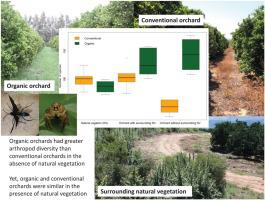Agriculture, Ecosystems & Environment ( IF 6.6 ) Pub Date : 2021-01-07 , DOI: 10.1016/j.agee.2020.107295 Alistair D. Galloway , Colleen L. Seymour , Rene Gaigher , James S. Pryke

|
Current global declines in insect populations emphasise the need for biodiversity appropriate farming. Organic farming can promote in-field biodiversity, yet this may depend on surrounding vegetation, which acts as a source habitat for arthropod predators that promote pest suppression. Here we assess the role that natural vegetation plays in relation to farm management type (conventional versus organic farming) for arthropod predator diversity in a perennial cropping system (citrus orchards). We also determine how environmental variables, specifically plant species richness, flower abundance, cover crop height, litter depth, as well as grass, herbaceous, woody plant and rock cover, influence arthropod predators across the orchard – natural vegetation landscape mosaic. Arthropod species richness and abundance were significantly higher on organic farms, but species composition varied with biotope (natural vegetation, orchards with associated natural vegetation and those without associated natural vegetation). There was an interesting interaction between farming type and surrounding biotope. Organic farms had greater arthropod predator species richness and abundance than conventional farms in the absence of natural vegetation, but there was no difference between organic and conventional orchards in the presence of natural vegetation. Thus, patches of remnant natural vegetation improve the biodiversity of arthropod predators within conventional orchards. The environmental variables sampled here were all significant drivers for some focal taxa in most biotopes, emphasising the need to conserve heterogeneity in agricultural systems. The value of organic farming depends on landscape context, particularly proximity of natural vegetation. It is therefore recommended that to improve predator species richness and abundance, farmers should aim to diversify both local- and landscape-level environmental heterogeneity.
中文翻译:

有机农业促进了节肢动物的捕食,但这取决于附近的自然植被
当前全球昆虫种群的减少强调了对生物多样性适当农业的需求。有机耕作可以促进田间生物多样性,但这可能取决于周围的植被,而该植被是节肢动物捕食者的生境,可以促进害虫抑制。在这里,我们评估了多年生作物系统(柑桔园)中节肢动物捕食者多样性方面自然植被与农场管理类型(传统农业与有机农业)之间的关系。我们还确定环境变量(尤其是植物物种的丰富性,花的丰度,覆盖作物的高度,凋落物的深度以及草,草,木本植物和岩石的覆盖)如何影响整个果园的节肢动物食肉动物-自然植被景观马赛克。有机农场的节肢动物物种丰富度和丰度明显更高,但物种组成随生物群落而变化(自然植被,具有相关自然植被的果园和无相关自然植被的果园)。农业类型和周围生物群落之间存在有趣的相互作用。在没有天然植被的情况下,有机农场的节肢动物捕食者物种丰富度和丰度要高于传统农场,但是在有天然植被的情况下,有机果园和常规果园之间没有差异。因此,残留的自然植被斑块改善了传统果园中节肢动物食肉动物的生物多样性。这里采样的环境变量都是大多数生物群落中某些分类群的重要驱动因素,强调需要保持农业系统的异质性。有机农业的价值取决于景观背景,尤其是自然植被的接近程度。因此,建议提高捕食者物种的丰富度和丰度,农民应致力于使当地和景观一级的环境异质性多样化。


























 京公网安备 11010802027423号
京公网安备 11010802027423号